|
|
Wolf Statues, Sculptures and Figurines
The wolf is possibly one of the most intriguing creatures known to inspire much of the native American culture and many others all across the world. Their howl and the manner in which they collaborate as a pack make them a favorite for many of the naturalists to study. Here, our range of wolf statues and sculptures including tabletop resin wolf figurines for the den or lodge as well as large to life size bronze wolf sculptures to inspire the home or garden decor seeking a love of the wildlife theme. Our wolf sculptures also make fine mascots for organizations and schools. Please email for more information on our bronze wolf statues and sculptures. Wolves have intrigued mankind for centuries. Seeing a gray wolf means you need to come to terms with your instincts. In native American culture, the wolf represents loyalty, strong family ties, communication and intelligence. They are celebrated also because wolves are considered to be accomplished hunters and are therefore accrued a lot of supernatural powers. For those who adore the wolf, our line of wolf statues celebrates this intelligent animal which has often been used as a mascot. There are many types of bronze wolf statues we offer in our store. One of them shows a wolf with its cubs, thereby highlighting the manner a mother wolf nurtures her young. As part o the pack, a mother wolf's duties are to her young cubs. Wolf pups are about one pound in weight when they are born and they come with closed eyes at birth. The mother wolf teaches her young ones how to maneuver their way around the wild and to hunt for food. The other wolf statue that we have is the howling wolf statue. As you probably realize, wolves how to communicate their location to other members of their pack. They also howl to warn off rivaling packs from encroaching in their territory. Our bronze wolf statues includes two types of howling wolf statues that celebrate the beauty of these intelligent animals. It is said that wolves howl also to show affection to their pack members. For those wanting the howling wolf statues, we offer free shipping across the 48 contiguous statues in the USA. The statues also come with a heavy discount price. The other wolf statues are commanding choices for adding to a garden or park or even school. Schools usually adopt a wolf statue because of their need for a having a mascot. They come beautifully detailed and will add character to the garden landscape. We even have standing wolf sculptures and sitting wolf statues for those looking to add them to the garden. We are sure you'll find our wolf statues make a fine addition to add to your home or school.
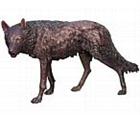 |
|
List Price: $5,500.00
Your Price: $2,998.00
You Save: $2,502.00 (45 %)
|
* Whole number only
|
|
|
A lone wolf seeks its way back to its lost pack in this beautiful sculpture for the home or garden. Bronze.
|
|
|
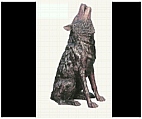 |
|
List Price: $6,250.00
Your Price: $3,095.00
You Save: $3,155.00 (50 %)
|
* Whole number only
|
|
|
Our wolf appears to sound the call of the wild as it seeks the company of its friends. Bronze.
|
|
|
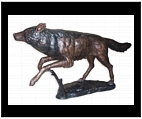 |
|
List Price: $4,850.00
Your Price: $3,350.00
You Save: $1,500.00 (31 %)
|
* Whole number only
|
|
|
Accent with a theme of the wildlife with our life size wolf sculpture created from bronze. Hand finished.
|
|
|
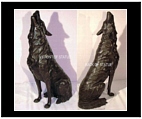 |
|
List Price: $7,650.00
Your Price: $5,500.00
You Save: $2,150.00 (28 %)
|
* Whole number only
|
|
|
The call of the wolf is beautifully reproduced here in this amazing bronze wolf sculpture of the calling. Hand finished.
|
|
|
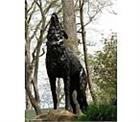 |
|
List Price: $7,650.00
Your Price: $5,500.00
You Save: $2,150.00 (28 %)
|
* Whole number only
|
|
|
One of our larger wolf sculptures, this amazing wolf adds a wonderful addition to the garden or as a statement in the hallways. Bronze.
|
|
|
Why the Wolf Will Always Amaze Us
Many people often associate wolves as “dogs” and the fact is wolves do share a relationship with dogs. They are the closest relatives to dogs but they are the largest members of the dog family. Records indicate that dogs possibly evolved from wolf populations which have gone extinct during the time of the Last Glacial Maximum. For the record, the Last Glacial Maximum was the last period in the earth’s climate history when ice sheets were at their greatest extension.
So, what is it that attracts our attention when we think about the wolf? Most of us remember the wolf several ways including the sound of its spine-tingling howl. When the wolf howls, it almost shatters the quietness of the wilderness and the sound of the howl can reach miles away. It is the way that the lone wolf may sound to attract the members of its pack to its rescue. In some situations, the sound of the wolves may reach a different pitch. This can happen when two wolf packs threaten the other with their howls in a move to protect their territory. When threatened by another pack, wolves may sound off a communal howl to an invading pack to keep away from their territory.
The Gray Wolf
One of the common wolf species is the gray wolf. Members of the gray wolf oftentimes travel in average packs of about 5-11 members and may include the wolf couple and their young. Occasionally, some wolf packs can reach about 40 members and will include other adult male and female wolves. It is rare that wolves allow another to enter their pack. Most often, they typically kill any wolf that tries to enter their pack but are kinder to young wolf pups which are lost. However, it is known that wolves may allow an adult wolf to enter the pack if it means replacing a dead wolf member. In all, the gray wolf is a social animal and the mated wolf pair will produce young pups every year. The older wolves will guard and train their young until the offspring are able to leave the pack after 1-4 years. The reasons for leaving often time arises because of the need to search for food and sexual maturity.
Wolves are known to travel great distances stretching for miles. While the young may stay in the care of their parents, adult wolves may leave the pack and travel for distances of up to 400 miles.
Territorial
Wolves typically travel in packs and rarely share their pack with members from another pack. This however can change in the events of migration where different wolf packs may join together to combat a certain situation plaguing their packs such as food shortages or weather. Sometimes the threat of man’s encroachment on their land may also force wolves to relocate.
However, wolves are known to be territorial animals and oftentimes set up control over large territories to expand their control over prey which include large prey like the deer, elk and the moose. They will fight to death if their territory is threatened by other wolf packs. In general, wolves mark their territory by a series of scent marking which includes urination and ground scratching, attacks and communal howling. Wolves can express their aggression to maintain territory by spraying their urine scent every 200 plus meters of land. The scent are known to stay for about 2-3 weeks on places like regular pathways, near rocks and trees and sometimes on the skeletons of large animals they would have feasted on. They travel in packs constantly in search of prey but will avoid hunting in the borders of their territory for fear of meeting other unfriendly wolf packs. However, when reasons make it difficult to remain in their territory, wolves will leave during times of severe food shortage.
While man may fear the wolf, it is rare that wolves have been known to attack humans. However, they will attack domestic animals and because of this, wolves have met their demise at the hands of man this way. Because of the threat of human encroachment, there are fewer gray wolves in Europe today although conservation efforts have helped protect breeds in much of Alaska, Canada and Asia. |
|
|